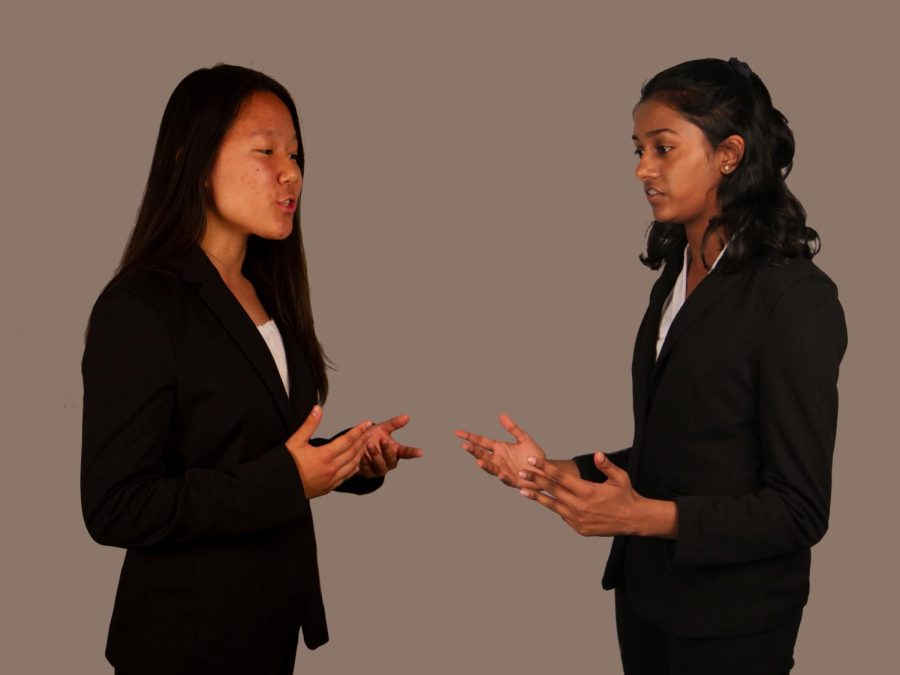Lynbrook debaters make history with gold bid win
November 9, 2018
Ask any debater, and the ultimate goal for his or her debate career would be to compete in the the most prestigious competition for high school debaters: the Tournament of Champions (TOC), an annual tournament held in Kentucky. For juniors Cindy Xu and Rachana Muvvala — Public Forum debate partners and Vice President and Secretary Treasurer, respectively, of Lynbrook’s Speech and Debate Club — this dream became a reality at the Stephen Stewart Invitational, which took place from Sept. 29 to 30 at Milpitas High School.
Despite how early in the school year the Stephen Stewart tournament was, Xu and Muvvala attribute their success to their extensive preparation, which began during the summer. When the school year began, their preparation only intensified.
“We did a couple of practice debates and continued researching during the school year,” Muvvala said. “Going into the tournament, we were feeling more confident than usual because we had a decent amount of preparation done.”
The two got off to a strong start in the tournament, winning four out of six rounds in the preliminary competition, and entered the elimination rounds. After advancing through three elimination rounds, the team received the silver bid by qualifying for semifinals, and later earned a gold bid upon reaching the final round, qualifying them for TOC. The pair is the first team in Lynbrook Speech and Debate history to qualify for a gold bid, which gained them an entry in the TOC, which teams qualify for by earning either a gold bid or two silver bids.
“After each round we won, we got a little more excited,” Muvvala said. “After we won [the semifinals], we were like, ‘No way, this isn’t happening;’ it was not something we expected at all, but it was also really rewarding to feel like the hard work we put in really paid off.”
Xu and Muvvala began debating as partners in Miller Middle School’s Speech and Debate Club, where they also participated in Public Forum debate, a form of partner debate. The two ended up debating together by chance, as both entered the club without partners. Though they both admit that there was some discomfort initially, the dynamic has since changed.
“I remember being kind of a bossy partner in the beginning, so the partnership was a little weird at first, but by the end of seventh grade, we had become way closer,” Muvvala said. “We became Public Forum partners again halfway through sophomore year. This time around, the relationship was very different because we had been good friends for a while.”
The two debated in Public Forum debate for a year at Miller, but switched to Lincoln-Douglas, a style of one-on-one debate, throughout eighth and ninth grade. They decided to switch back to Public Forum in sophomore year due to time constraints and travel costs. Upon their return, they reunited as debate partners. Working as a team has since been their preference. Both have found that having a partner during rounds has been beneficial.
“I think two heads are better than one,” Xu said. “Sometimes in a round, I’ll blank out and be like ‘Hey Rachana, help me out,’ and she’ll know exactly what to say. Or, other times, she might ask me to explain something to her; it makes for good partner support.”
Their close-knit relationship encourages them to push one another to strengthen their ability to think on their feet during rounds and stay on top of the their responsibilities.
“Working together helps us grow as debaters; we try being pretty critical of each other in practice,” Muvvala said. “It’s a team effort, we check each other to make sure everything is going well and our speeches are coming along well.”
One of their favorite memories working together was during the quarterfinals round at the Santa Clara University tournament last April. Xu and Muvvala anticipated it to be one of their tougher rounds: the opposing pair knew the arguments in Xu and Muvvala’s case and had prepared responses, and their opponents also won the coin flip, which allowed them to determine which side they would debate on. However, both went in with high spirits and worked together to win the round.
“I just remember being really excited during the round; it was like some kind of adrenaline rush,” Xu said. “We immediately clicked and realized what was wrong with our opponent’s case, and we just went for it.”
Though Xu and Muvvala cannot begin formal preparation for the TOC until the topic is released a couple months before the tournament takes place in April 2019, they plan to employ their usual preparation style, and potentially ramp up their drills and practice in anticipation of the tough competition. They continuously seek the feedback of other team members and consult with their coach to strengthen their arguments.
“Our case will go through tons of revisions,” Muvvala said. “We build a case, either on our own or together, then we have an informal debate about it. If we are able to quickly find holes in our arguments, we will probably get rid of that argument, and we repeat the process until we find something really strong.”
In spite of their success, Xu and Muvvala remain humble going into the TOC.
“Four years ago we would not have expected this. We still didn’t expect it this year, but sometimes luck goes in your favor,” Xu said. “We obviously don’t debate just for wins, but those are definitely an added confidence boost. We keep doing debate because we genuinely just love it.”



































































